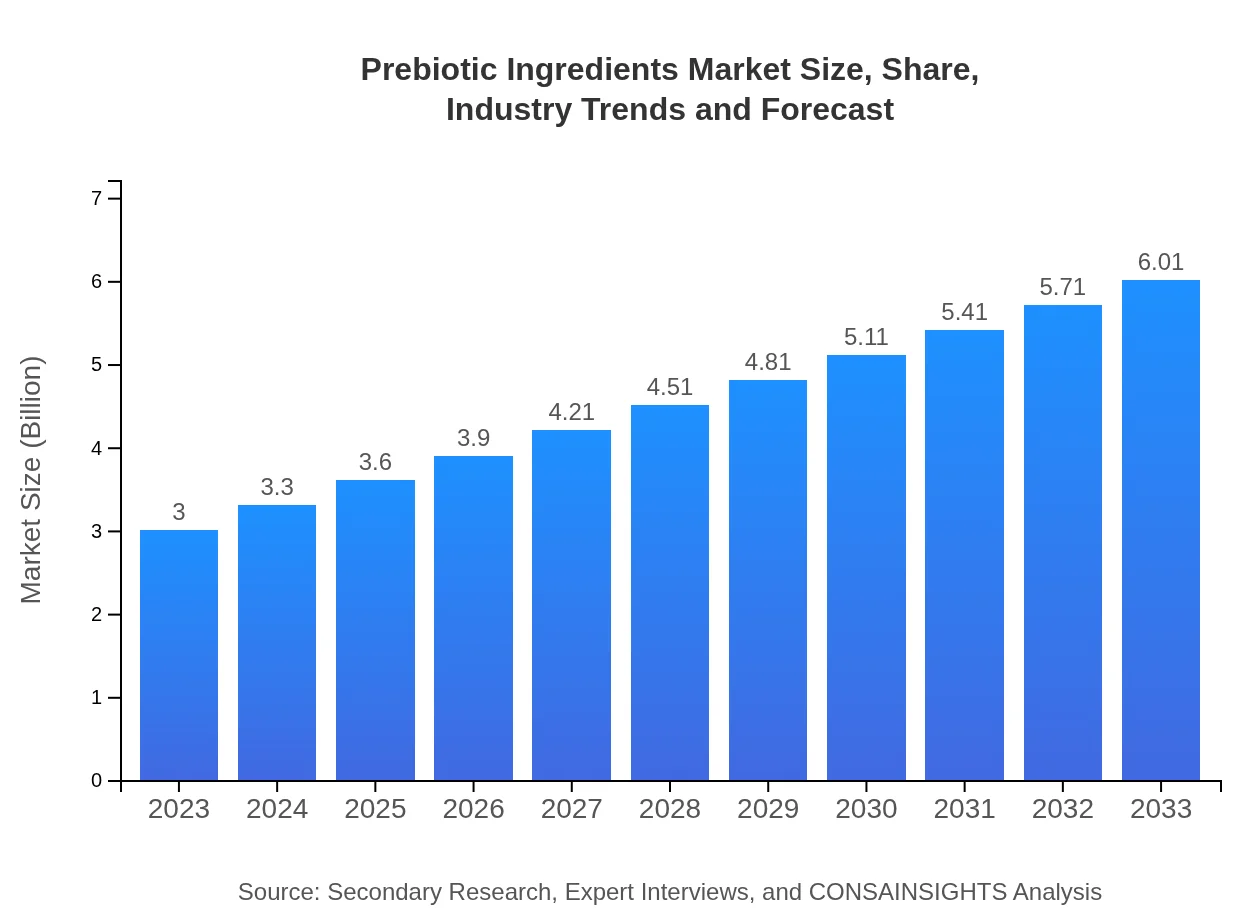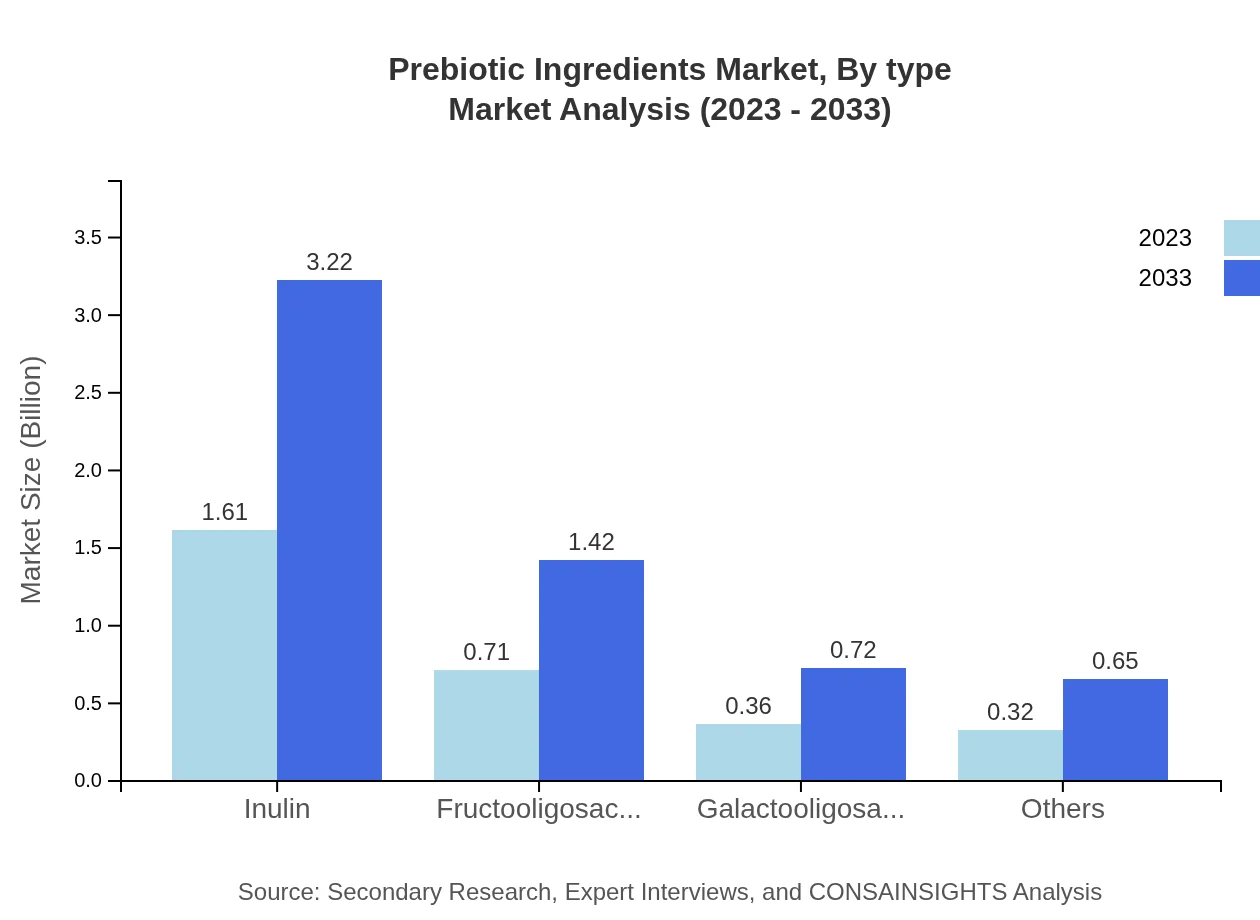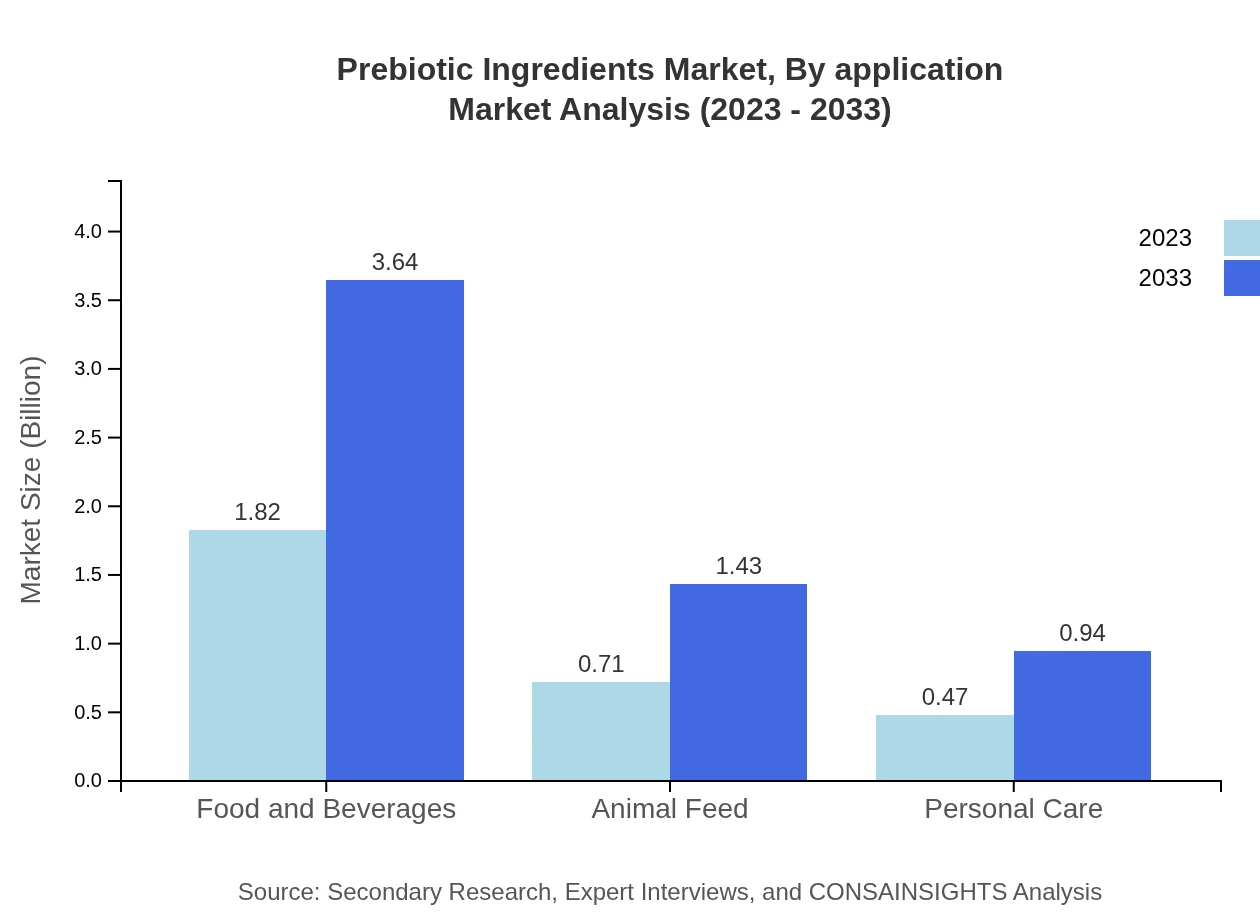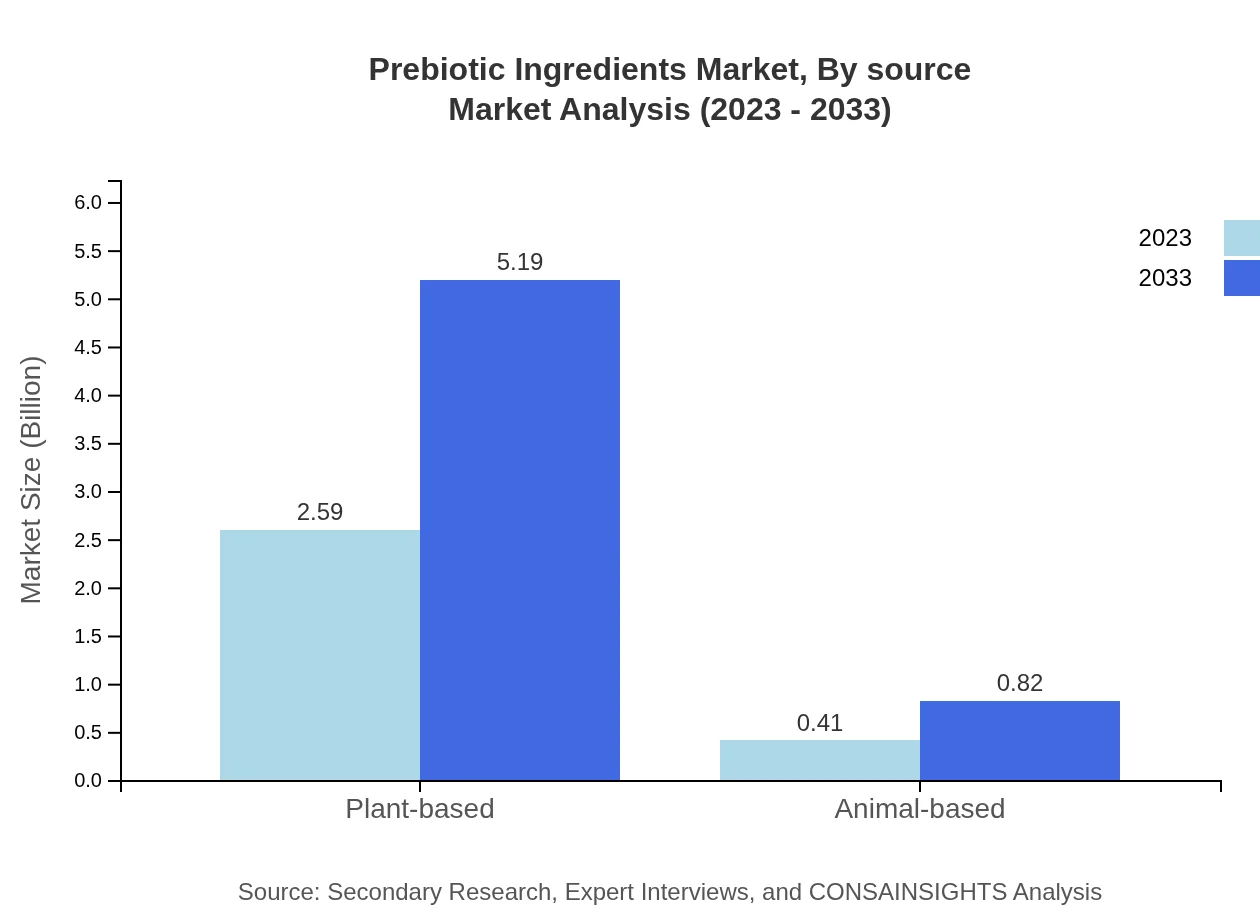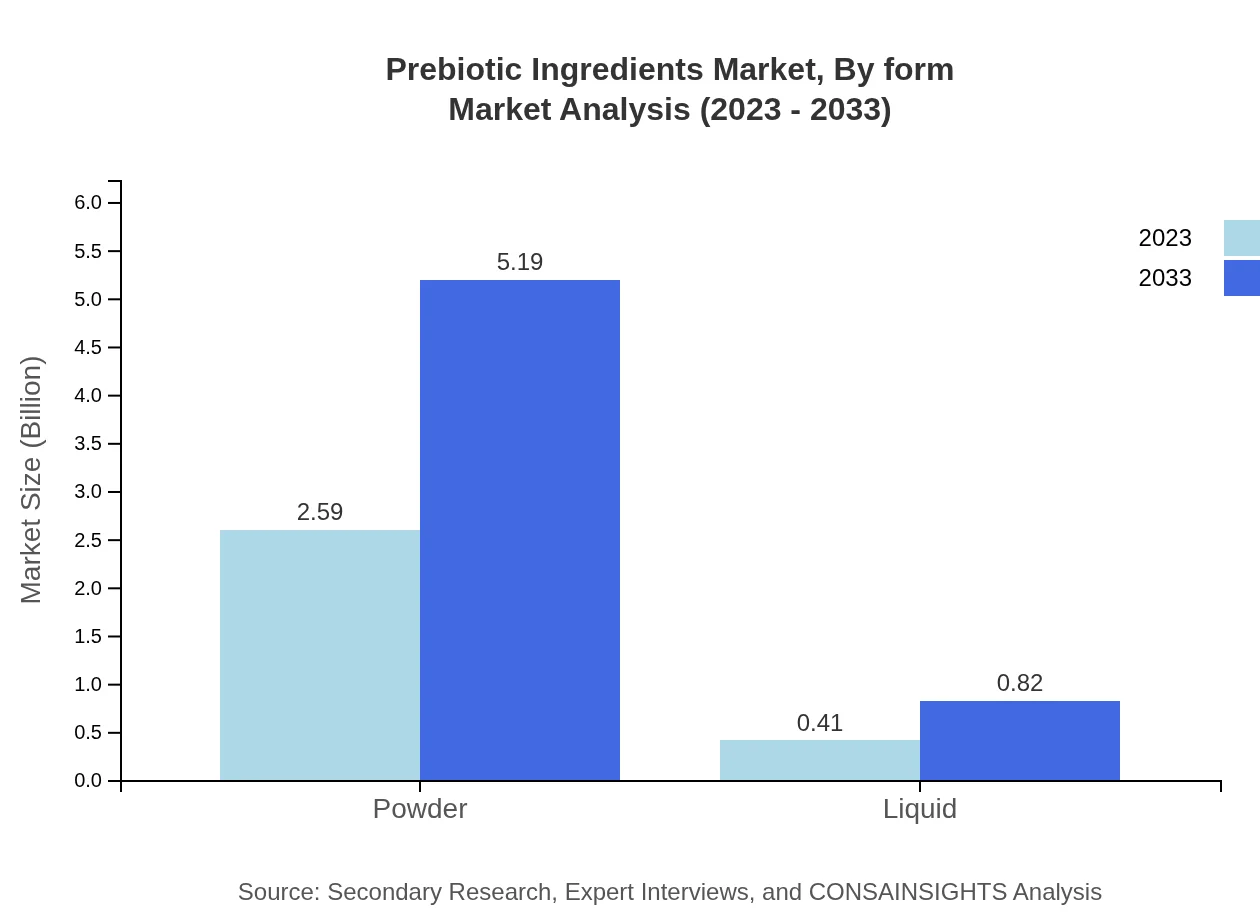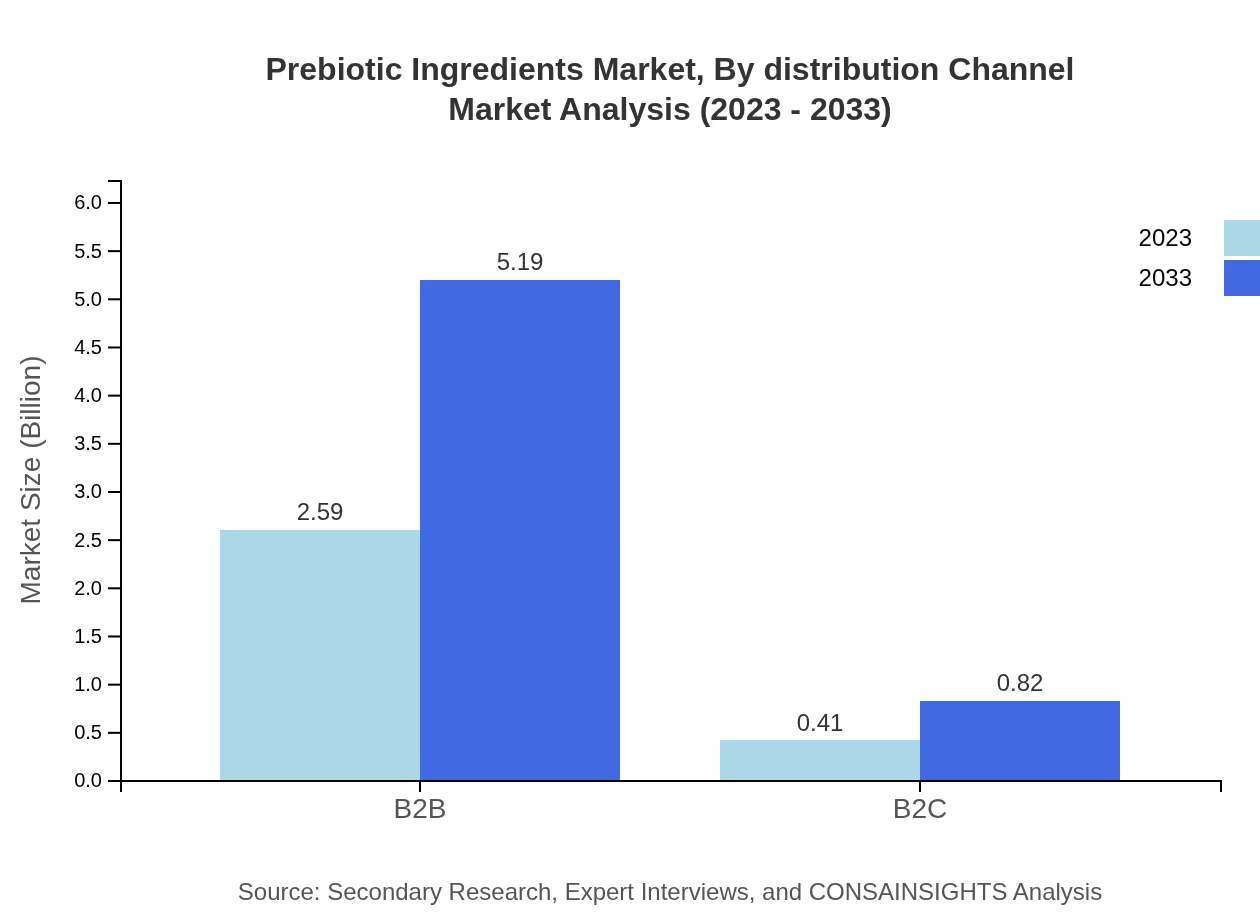Prebiotic Ingredients Market Report
Published Date: 31 January 2026 | Report Code: prebiotic-ingredients
Prebiotic Ingredients Market Size, Share, Industry Trends and Forecast to 2033
This report provides a comprehensive analysis of the Prebiotic Ingredients market, covering its dynamics, segmentation, regional overview, and competitive landscape, with forecasts from 2023 to 2033 to guide strategic decisions.
| Metric | Value |
|---|---|
| Study Period | 2023 - 2033 |
| 2023 Market Size | $3.00 Billion |
| CAGR (2023-2033) | 7% |
| 2033 Market Size | $6.01 Billion |
| Top Companies | Beneo GmbH, Kraton Corporation, DuPont Nutrition & Biosciences, FrieslandCampina, Yeo Valley Organic |
| Last Modified Date | 31 January 2026 |
Prebiotic Ingredients Market Overview
Customize Prebiotic Ingredients Market Report market research report
- ✔ Get in-depth analysis of Prebiotic Ingredients market size, growth, and forecasts.
- ✔ Understand Prebiotic Ingredients's regional dynamics and industry-specific trends.
- ✔ Identify potential applications, end-user demand, and growth segments in Prebiotic Ingredients
What is the Market Size & CAGR of Prebiotic Ingredients market in 2023?
Prebiotic Ingredients Industry Analysis
Prebiotic Ingredients Market Segmentation and Scope
Tell us your focus area and get a customized research report.
Prebiotic Ingredients Market Analysis Report by Region
Europe Prebiotic Ingredients Market Report:
Europe's prebiotic ingredients market is projected to expand from $0.77 billion in 2023 to $1.54 billion by 2033. This region is known for its rigorous food safety regulations and high consumer spending on health and wellness products, fostering a robust market environment.Asia Pacific Prebiotic Ingredients Market Report:
In 2023, the Asia Pacific region holds a market value of $0.66 billion, projected to double to $1.32 billion by 2033. The growing emphasis on health and wellness, increasing population awareness regarding gut health, and rising disposable incomes are key drivers of growth.North America Prebiotic Ingredients Market Report:
In North America, the market stood at $1.12 billion in 2023 and is anticipated to reach $2.24 billion by 2033. The prevalence of lifestyle diseases and increasing interest in digestive health supplements are central to this market's expansion.South America Prebiotic Ingredients Market Report:
The South American market was valued at $0.30 billion in 2023, expected to climb to $0.60 billion by 2033. Consumer trends indicate an escalating preference for natural and organic products, propelling the demand for prebiotic ingredients.Middle East & Africa Prebiotic Ingredients Market Report:
The Middle East and Africa, while currently valued at $0.16 billion in 2023, is set to reach $0.32 billion by 2033. The growing focus on nutrition and the rising prevalence of health awareness campaigns are key growth factors in this region.Tell us your focus area and get a customized research report.
Prebiotic Ingredients Market Analysis By Type
The market for prebiotic ingredients by type indicates a significant dominance of powder forms, valued at $2.59 billion in 2023, projected to reach $5.19 billion by 2033, holding 86.3% market share. Liquid forms are anticipated to double from $0.41 billion to $0.82 billion, accounting for 13.7% share. Notably, inulin leads with a market value of $1.61 billion (53.6% share) in 2023, expected to reach $3.22 billion by 2033. Fructooligosaccharides and galactooligosaccharides also contribute significantly to the market, with projections of $0.71 billion and $0.36 billion in 2023, respectively.
Prebiotic Ingredients Market Analysis By Application
In the application segment, the food and beverages industry dominates the prebiotic ingredients market, with a size of $1.82 billion in 2023, projected to grow to $3.64 billion in 2033, representing a share of 60.55%. Animal feed follows, estimated at $0.71 billion (23.77% share) in 2023, expected to rise to $1.43 billion by 2033. The personal care sector, while smaller, is anticipated to grow from $0.47 billion to $0.94 billion. These trends reflect a broader acceptance of prebiotics across diverse sectors.
Prebiotic Ingredients Market Analysis By Source
The source-based segmentation highlights the growing preference for plant-based prebiotic ingredients, which held a value of $2.59 billion in 2023, expected to rise to $5.19 billion by 2033, maintaining a consistent share of 86.3%. Animal-based sources are smaller, with a market size of $0.41 billion (13.7% share), anticipated to grow to $0.82 billion as consumer preferences evolve.
Prebiotic Ingredients Market Analysis By Form
In terms of form, the powder form remains the preferred choice among consumers, contributing to around 86.3% share in the market, while liquid forms capture a smaller segment, accounting for 13.7%. The convenience and versatility of powdered ingredients drive their popularity, allowing for easier incorporation into various food and supplement forms.
Prebiotic Ingredients Market Analysis By Distribution Channel
The B2B distribution channel dominates the prebiotic ingredients market, representing 86.3% market share in 2023, valued at $2.59 billion, anticipated to reach $5.19 billion by 2033. In contrast, the B2C segment is smaller, valued at $0.41 billion (13.7% share), yet it is expected to experience growth as more consumers purchase prebiotic products directly through retail channels.
Prebiotic Ingredients Market Trends and Future Forecast
Tell us your focus area and get a customized research report.
Global Market Leaders and Top Companies in Prebiotic Ingredients Industry
Beneo GmbH:
Beneo GmbH is a leading manufacturer of functional ingredients with a focus on prebiotics derived from natural sources. Their continuous innovation makes them a significant player in this market.Kraton Corporation:
Kraton Corporation specializes in performance and styrenic block copolymers, including prebiotic products, contributing to sustainable solutions across various applications.DuPont Nutrition & Biosciences:
DuPont offers a robust portfolio of bio-based ingredients, emphasizing health, nutrition, and wellness through their range of prebiotic solutions.FrieslandCampina:
FrieslandCampina is a global dairy company that also engages in the development of prebiotic ingredients, enhancing their product offerings in functional foods.Yeo Valley Organic:
Yeo Valley is known for its organic dairy products and is progressively incorporating prebiotic ingredients to improve gut health in their offerings.We're grateful to work with incredible clients.









FAQs
What is the market size of prebiotic ingredients?
The global prebiotic ingredients market is valued at approximately $3 billion in 2023, with an anticipated compound annual growth rate (CAGR) of 7%. The market is expected to grow significantly by 2033, reflecting increasing consumer demand.
What are the key market players or companies in this prebiotic ingredients industry?
Key players in the prebiotic ingredients industry include prominent companies specializing in dietary supplements and food additives. Major stakeholders include suppliers and manufacturers that consistently innovate to meet market needs and consumer preferences.
What are the primary factors driving the growth in the prebiotic ingredients industry?
Significant drivers of growth in the prebiotic ingredients market include rising health awareness among consumers, the increasing popularity of functional foods, and advancements in food technology that enhance the bioavailability of prebiotics.
Which region is the fastest Growing in the prebiotic ingredients market?
The North American region is set to exhibit robust growth in the prebiotic ingredients market, projected to rise from $1.12 billion in 2023 to $2.24 billion by 2033. Other rapidly growing regions include Europe and Asia Pacific.
Does ConsaInsights provide customized market report data for the prebiotic ingredients industry?
Yes, ConsaInsights offers customized market reports tailored to specific needs in the prebiotic ingredients sector. These reports can provide in-depth analysis and insights based on set parameters, helping stakeholders make informed decisions.
What deliverables can I expect from this prebiotic ingredients market research project?
Expected deliverables from the prebiotic ingredients market research include detailed market analysis, trends analysis, competitive landscape assessments, and insightful recommendations based on quantitative and qualitative data.
What are the market trends of prebiotic ingredients?
Current trends in the prebiotic ingredients market include a shift towards plant-based sources, increasing incorporation of prebiotics in food and beverage applications, and heightened consumer demand for digestive health products.

